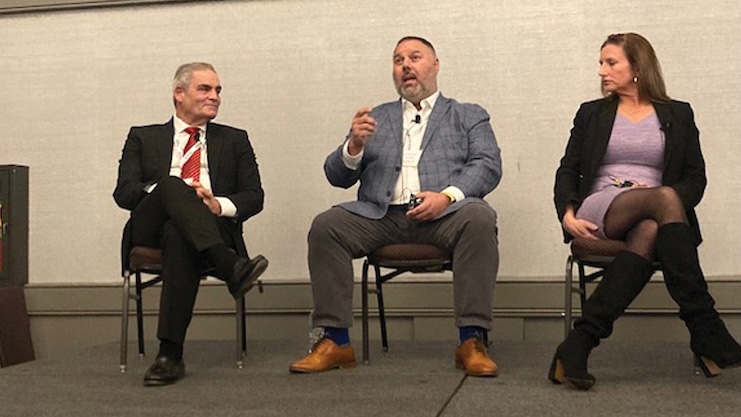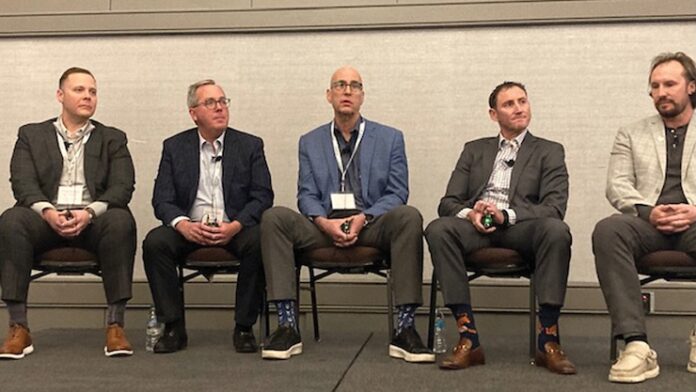The robust growth momentum of the extended-stay segment over the last several years was reinforced by a wide range of hotel executives during the Extended Stay Lodging Association (ESLA) Development & Operations Workshop Series.
Brand executives and owner/operators alike shared some key strategies and best practices within the segment as they attended ESLA’s inaugural event last month in Atlanta, Georgia. In a session entitled “Brand Selection, Chain Scale, and Operating Strategies,” panelists provided their perspective on the segment’s recent popularity as well as the brand selection process.
David Wilner, SVP, franchise development, Wyndham Hotels & Resorts, framed the conversation.
“The reason there is this workshop now and all these other extended-stay focused conversations is because people out there have heard you can hit those 45 percent, 55 percent, or 65 percent GOP margins. Who in this industry does not want to hit 65 percent GOP margins? But we’re really talking about the [upper-economy or mid-market] segment within extended stay; not all extended stay is going to hit that,” he said.
Wilner further emphasized the importance of maintaining the “sanctity of the model.”
He added, “When I’m talking to a developer, I really want to know why they’re developing and why they want to get into this extended-stay model, as well as if they are committed to the segment. The discipline of the management company who’s operating these is hugely important, but equally as important is the brand’s commitment to staying true to that model.”
Robert Scribner, regional VP, franchise development, Choice Hotels International, elaborated on location specifics.
“I think you have to really dive into the market. What kind of extended-stay demand is within that market? Is it a higher rate? Is it a true extended-stay, long length of stay, or is it a brand that calls themselves extended stay and maybe has an average length of stay of three to four nights? So, you’ve really got to drill down to what is delivering that extended-stay demand and why are those hotels successful as extended stay,” he said.
Frank McFadden, director, franchise development, southeast region, Hilton Worldwide—who noted he has a “feasibility background”—reinforced the point.
“My first question for a developer is always, where’s your demand coming from? You need to understand the demand patterns and what’s the price sensitivity,” he noted.
Ron Stewart, regional VP, development, Marriott International, elaborated on the point.
“Every market is going to be a little bit different, and we really are going to be directing people to what we feel is the right brand in our ecosystem. I think you really have to do your homework on the data; you look at the demand generation and you really land on a conclusion of what’s going to the optimal brand,” he said.
Jason Ballard, head of operations, Hyatt Studios, meanwhile, emphasized the importance of loyalty programs and having room to grow in a market.
“Having a loyalty base is extremely important in setting that foundation for success and ramping up successfully. What you want to do is pick a brand that has either a good, strong loyalty base in that market or no presence at all,” he said, pointing out the value of being able to tell owners, “You can be the only Hyatt hotel within 30 miles.”
Scribner further added, “I think that when it comes to the lower segments the loyalty programs aren’t as important and they can become a cost center. I think that also has to go into investigating those individual markets and figuring out which is the best brand for the market. If you have a bunch of upscale extended-stay hotels that are in a market and are doing great, that doesn’t necessarily mean an economy extended-stay hotel is going to do great and vice versa,” he noted.
The Challenges
The panelists also addressed some of the potential pitfalls and drawbacks to the extended-stay segment while underscoring the need for education.
“Some municipalities frankly won’t allow an economy extended-stay hotel, so that’s something that the developer needs to kind of dive into while they’re choosing their brand. Will the city allow stovetops? Will the city allow the smaller room sizes or smaller lobby sizes? Especially in the Atlanta metro, we see all these crazy codes thrown in different counties and cities to try to prevent the space. That’s a big one that [developers] really need to be aware of going into it early,” said Scribner.
“I think that’s an advantage of being a local developer because you tend to know your market a little bit better,” said Ballard. “If you’ve built there before, you have relationships with the council already. I’ve personally gone to a couple board council meetings to explain extended stay and what it is. I’ve explained why we’re not going to be having a lot of police calls and what kind of guests we have, what our average rate will be. I’ve reached out and said, ‘Please councilman come visit our model room or come see one of our hotels, so you see the experience.’ It takes going that far … I think we need to flip the script as an industry to make that story better for all of us.”
Advice for Operators
Meanwhile, a panel focused on “Operational Efficiency” generated some advice from leading owner/operators in the segment.
Arturo Jimenez, VP, onboarding and training, Ark Hospitality, touted the formula for success within the segment.
“The economy extended-stay model works; it makes a lot of money. You’ve got to find a partner and operator that can take that idea and vision that you have and just bring it to the next level because there’s a lot of money to be made there,” he said.
Doug Artusio, chairman, ESLA—who is also CEO of Dellisart Hospitality—provided the final word.
“Know who you are as a property, know your capabilities, and know your customers so you can be realistic on what your plan is. Don’t accept that the past is the best you can do. I think you need to always strive for improvement from the bottom up on your business model. We improve every year, we try our hardest, and if we fail, we fail together, but generally, we’re always making progress. Just enjoy it [the extended-stay segment] because it’s the best aspect of this whole hospitality business,” he concluded.












